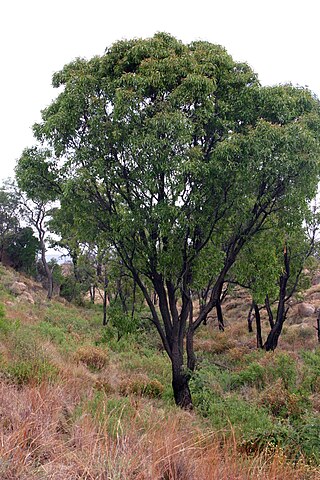Intermedia is an art theory term coined in the mid-1960s by Fluxus artist Dick Higgins to describe the strategies of interdisciplinarity that occur within artworks existing between artistic genres. It was also used by John Brockman to refer to works in expanded cinema that were associated with Jonas Mekas' Film-Makers’ Cinematheque. Gene Youngblood also described intermedia, beginning in his Intermedia column for the Los Angeles Free Press beginning in 1967 as a part of a global network of multiple media that was expanding consciousness. Youngblood gathered and expanded upon intermedia ideas from this series of columns in his 1970 book Expanded Cinema, with an introduction by Buckminster Fuller. Over the years, intermedia has been used almost interchangeably with multi-media and more recently with the categories of digital media, technoetics, electronic media and post-conceptualism.

Lavandula angustifolia, formerly L. officinalis, is a flowering plant in the family Lamiaceae, native to the Mediterranean. Its common names include lavender, true lavender and English lavender ; also garden lavender, common lavender and narrow-leaved lavender.

Club Sportivo 2 de Mayo is a Paraguayan football club in the city of Pedro Juan Caballero in Amambay who plays in the Primera División, after being promoted from División Intermedia in 2023. The club reached promotion to the Paraguayan Primera División for the first time in 2005.
The División Intermedia, also known as the Segunda División, is the second tier professional football league in Paraguay. It is organized by the Asociación Paraguaya de Fútbol.

Faurea macnaughtonii is a species of tree in the family Proteaceae. It is found in South Africa and Eswatini, and was named in honour of Colin B. MacNaughton, Conservator of Forests at Knysna during the 1890s.

Faurea is a genus containing 16 species of flowering plants in the protea family which occur in the summer rainfall area of southern Africa, extending to tropical Africa and Madagascar. The name honours South African soldier and botanist William Caldwell Faure (1822-1844) who was killed on active service in India.

Independiente Foot-Ball Club also referred to as Independiente de Campo Grande or simply Independiente CG is a Paraguayan football club based in the neighbourhood of Salvador del Mundo, an area previously known as Campo Grande, in Asunción. Founded on September 20, 1925, they play in Division Intermedia, the second division in the Paraguayan football league system. Their home stadium is Estadio Ricardo Gregor.

Faurea saligna is a graceful, semi-deciduous tree of the family Proteaceae growing to about 10 metres, or up to 20 metres under forest conditions. Found from tropical Africa south to the Transvaal, Swaziland and Natal, often in large communities on sandy soil and along stream beds.

Acronicta intermedia is a moth of the family Noctuidae. It is found in the Korean Peninsula, the Russian Far East, Japan, and Taiwan.
Ulmus × intermediaElowsky is a natural hybrid elm occurring across Nebraska and several other Midwestern states, derived from the crossing of Ulmus rubra and Ulmus pumila. As Red Elm U. rubra is far less fertile, and highly susceptible to Dutch elm disease (:DED), it could eventually be hybridized out of existence by U. × intermedia. The hybrid was first reported from the wild in the Chicago region in 1950 and was provisionally named U. × nothaWilhelm & Ware in 1994.
The División Intermedia, the second division of Peruvian football (soccer) in 1984 until 1987. The tournament was played on a home-and-away round-robin basis.

Faurea galpinii is a small tree that grows to 10 m (20 ft.) tall, but its trunks will vary depending on growing conditions. The leaves of F. galpinii are alternately lanceolate with wavy margins. When growing in the forest, the bark appears grey with smooth, concentric rings, although it can appear rough and dark under exposed conditions, and the variety Faurea gal pinii varies in size from 1 m to 2 m.

Faurea rochetiana, also known as the broad-leaved beechwood, is a tree found in much of Africa from Sudan south to Limpopo, Mpumalanga and northern KwaZulu-Natal. The tree is small and leafy. It has wider leaves, larger flowers and flower veins and also denser hairy twigs than the bushveld beechwood. The tree's national number is 76.
Faurea recondita, also known as the Kamdeboo beechwood, is a tree that forms part of the genus Faurea. It occurs in the Kamdeboo Mountains. The species was only identified in 2013 after it was discovered in 2008. The tree grows on average two metres high. It has many similarities with Faurea coriacea found in Madagascar.
Faurea lucida is a tree that forms part of the Faurea genus and is endemic to the Democratic Republic of the Congo.
Faurea forficuliflora is a tree that forms part of the Faurea genus and is endemic to Madagascar.
Faurea coriacea is a tree that forms part of Faurea genus.
Faurea delevoyi is a tree that forms part of Faurea genus and is native to Angola, Democratic Republic of the Congo, Malawi, Mozambique, Tanzania, Zambia and Zimbabwe.









